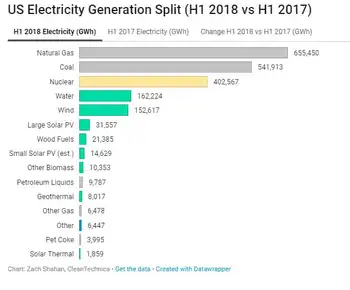Heat wave to push Midwest power demand to record
UNITED STATES - Power grid operators in the U.S. Midwest forecast record electricity usage July 31 as customers crank up their air conditioners to escape a blistering heat wave.
The Midwest Independent System Operator, which operates the grid in 15 states and the Canadian province of Manitoba, forecast peak demand would reach 119,396 megawatts on July 31, breaking the record of 113,054 MW set on July 17.
That would be more than 6 percent over last year's record of 112,197 MW.
One megawatt powers about 800 homes under normal weather conditions. During a heat wave, however, a megawatt powers fewer homes.
After temperatures climbed past 100 degrees (Fahrenheit) in some Midwest cities over the weekend, meteorologists forecast highs July 31 and August 1 would reach 94 in Indianapolis, 99 in Chicago, Detroit and St. Louis, and 101 in Minneapolis.
Also over the weekend, electricity traders noted the shut down and power reduction of several of the region's big nuclear power plants, including DTE Energy Co.'s Fermi 2 unit in Michigan and American Electric Power Co. Inc.'s Cook 1 unit in Michigan, would put additional strain on the system.
So far, the Midwest ISO, which serves more than 36 million people, has not taken any steps to reduce demand - no rotating blackouts - and heat related outages have been relatively minimal.
Some 50,000 customer in the Great Lakes region lost power over the weekend due to storms, not heat.
The Midwest ISO, however, notified generators and transmission owners to prepare for the heat and heavy demand.
That means the power companies should not conduct any unnecessary maintenance and should keep extra crews in the field to deal with unexpected emergencies.
Some utilities, including Exelon Corp.'s Commonwealth Edison Co. subsidiary in Chicago, already have asked customers to conserve energy this week.
In addition, the commercial and industrial customers who volunteered to cut power during emergencies in exchange for lower utility rates were on notice that the grid operator may call on them to reduce usage.
As the heat wave moves east, the grid operators in the Mid-Atlantic, Northeast and the Canadian province of Ontario forecast power usage would reach record levels on August 1 and 2.
PJM, the nation's biggest grid operator, serving more than 51 million people in the Mid-Atlantic and Midwest, forecast demand Tuesday would reach 140,249 MW, breaking the record of 139,746 MW set on July 17. That would surpass last year's record of 133,763 MW by almost 5 percent.
The Independent Electricity System Operator in Ontario, serving more than 11 million people, forecast demand Tuesday would reach 26,230 MW, breaking last year's record of 26,160 MW set on July 13.
ISO New England, serving more than 14 million people in the six New England states, forecast demand Wednesday would reach 28,100 MW, breaking the record of 27,395 MW set on July 18. That would surpass last year's record of 26,885 MW by almost 2 percent.
Meteorologists forecast the heat wave would break the evening of August 1 in the Midwest and August 2 in the Mid-Atlantic and Northeast, as a cold front moves across the continent from west to east, pushing the hot weather into the Atlantic Ocean.
Related News

Ontario explores possibility of new, large scale nuclear plants
TORONTO - Ontario is exploring the possibility of building new, large-scale nuclear plants in order to meet increasing demand for electricity and phase out natural gas generation.
A report late last year by the Independent Electricity System Operator found that the province could fully eliminate natural gas from the electricity system by 2050, starting with a moratorium in 2027, but it will require about $400 billion in capital spending and more generation including new, large-scale nuclear plants.
Decarbonizing the grid, in addition to new nuclear, will require more conservation efforts, more renewable energy sources and more energy storage, the report concluded.
The IESO…




